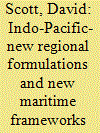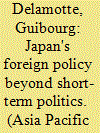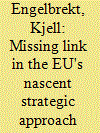|
|
|
Sort Order |
|
|
|
Items / Page
|
|
|
|
|
|
|
| Srl | Item |
| 1 |
ID:
116288


|
|
|
|
|
| Publication |
2012.
|
| Summary/Abstract |
How does America's greater focus on Asia impact the security policies of Japan and Australia? How does it change the nature of the Japan-US-Australia security partnership? This paper attempts to answer these questions by looking at Japanese and Australian responses to the Obama Administration's new security policy toward Asia called "rebalancing." After examining them, it argues that the regional allied response to America's new security posture has generated greater momentum for both allies to collaborate in wider areas in a more timely and effective way than before. It concludes asserting that, in the era of rebalance, Japan, the United States, and Australia have not only deepened their existing cooperation, but also have expanded potential areas of cooperation toward a more "dynamic" partnership
|
|
|
|
|
|
|
|
|
|
|
|
|
|
|
|
| 2 |
ID:
116287


|
|
|
| 3 |
ID:
116289


|
|
|
|
|
| Publication |
2012.
|
| Summary/Abstract |
Experience in the Great East Japan Earthquake (GEJE) by the Japan Self-Defense Forces (JSDF) was unprecedented in many ways. In addition to being the largest mobilization in its history, it was the first time that the JSDF operated under the Joint Task Force (JTF); it was also the first time that the JSDF was faced with a complex disaster that included both a large-scale natural disaster and the worst nuclear accident in Japan's history. The JSDF took away a number of "lessons learned" from this experience. These "lessons learned" by and large validate the "dynamic defense force" concept in the December 2010 National Defense Program Guidelines. Whether they can capitalize on the GELE experience and move forward is up to the JSDF and MOD leadership.
|
|
|
|
|
|
|
|
|
|
|
|
|
|
|
|
| 4 |
ID:
116292


|
|
|
|
|
| Publication |
2012.
|
| Summary/Abstract |
This article argues three things. First, it argues that at the conceptual level there has been a strategic rediscovery of a maritime regional framework, the Indo-Pacific. Second, it argues that at the policy level there is a significant regional security convergence, a degree of strategic balancing, between India and the United States in this Indo-Pacific. Third, it argues that at the causal level there is a common maritime challenge from China faced by India in the Indian Ocean and by the United States in the Pacific Ocean, a common Indo-Pacific strategic challenge which is generating this significant US-India naval convergence. In order to deal with such matters, the article looks at the strategic discourse employed around the concept of the Indo-Pacific, and the related maritime assets deployed in the Indo-Pacific by the United States and India.
|
|
|
|
|
|
|
|
|
|
|
|
|
|
|
|
| 5 |
ID:
116290


|
|
|
|
|
| Publication |
2012.
|
| Summary/Abstract |
In August 2009, the Liberal-Democratic Party (LDP), which had been in power since 1955, lost the general elections to a recently-formed party, the Democratic Party of Japan (DPJ). The LDP's foreign policy had placed emphasis on relations with the US, and on international cooperation and relations with Asia. The LDP's foreign and defense policy lacked a long term vision; it was incremental, pragmatic and could be described as reactive or passive. An examination of the DPJ's foreign policy, three years after its coming to power, reveals that it has accepted part of the LDP's inheritance. The Japan-US Alliance was reasserted as pivotal to Japan's security. Cooperation with Asia has not given birth to a new regional structure or to new institutional mechanisms, and dialogue with China has not improved; incrementalism is still preferred in the field of defense. Nonetheless, the fact that Japan's opposition is now a catch-all party at the center of the political scene changes the framework of foreign and defense policy-making considerably. Therefore, the likelihood of interpartite cooperation over foreign and security policy is theoretically conceivable. Nonetheless, political and institutional constraints to change in the field remain.
|
|
|
|
|
|
|
|
|
|
|
|
|
|
|
|
| 6 |
ID:
116291


|
|
|
|
|
| Publication |
2012.
|
| Summary/Abstract |
The Lisbon Treaty enacted in 2009 allows the European Union (EU) to adopt a foreign, security, and defense policy with a higher profile. In particular, the High Representative and the European External Action Service are now in a position to conduct a continuous conversation with China, India, Japan, and ASEAN beyond trade-oriented dialogues. But a genuine strategic approach toward Asia requires military expertise so as to adequately assess how to best contribute to stability in this part of the world. Military diplomacy involving individual member states already takes place, yet virtually no information is shared at the EU level. The adoption of a full-fledged strategic approach toward Asia would not only be politically astute and make excellent economic sense; it can also consolidate EU institutions in the realm of foreign, security and defense policy.
|
|
|
|
|
|
|
|
|
|
|
|
|
|
|
|
|
|
|
|
|